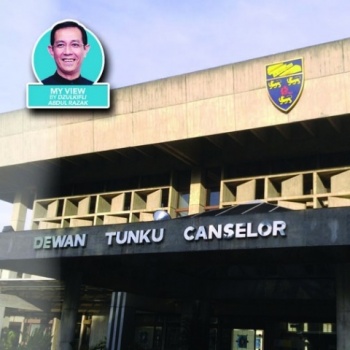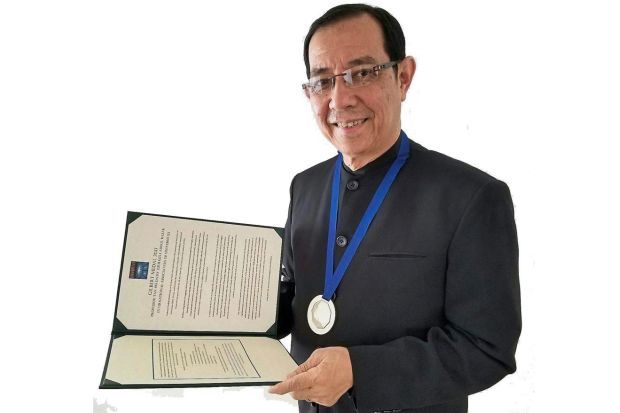Reclaiming university autonomy
Professor Tan Sri Dato' Dzulkifli Abdul Razak
My View - The Sun Daily
17 May 2017

UNIVERSITY autonomy is again back on the front burner. Ideas and Yayasan Sime Darby will be hosting next week the National Higher Education Conference 2017 on how to make our universities more autonomous. It is a defining moment for higher education in Malaysia to once again put forward the agenda on a national pedestal, if not internationally.
The last time this happened was in 2005 where the Ministry of Higher Education, which was just created then, set up a committee to look into the possibility of "transforming" higher education, chaired by the eminent educationist, Tan Sri Wan Zahid Noordin.
The committee in its final report, which was tabled in Parliament, suggested more than 130 recommendations with university autonomy at the heart of it all. Unfortunately, little has come out of it although there were more reports commissioned but all left the issue of autonomy in abeyance.
Hence the roundtable discussion serves as another milestone where issues related to university autonomy are being rearticulated after intensive research and consultative discussions culminating in the historic meeting of minds on May 23.
More so because the issue of university autonomy has been misunderstood, especially post-1974 following the Baling incident where university students became more vocal in asserting their social responsibility by speaking up for the marginalised. Right or wrong, they chose to exercise their ideas of what social responsibility means to them in the way many of their counterparts did across the globe. This was somewhat globally synergised by various local initiatives led by students supported by academics, by and large.
In Malaysia, such synergy took an unprecedented cohesiveness (akin to 1Malaysia) among several major student bodies beyond the usual divide. Unfortunately, it took a "dark" turn in the history of student activism when administrative and legalistic "intrusions" were swiftly applied. Campuses were raided, and several students were taken into "detention" allegedly to help with "investigations" as to the way the students discharged their social responsibilities, and engaging with the community that they belonged to.
In a nutshell, university autonomy as it was understood and practised then was intensely scrutinised. It would be fair to say that this left a marked impact in shifting what and how knowledge is to be delivered, generated and disseminated – be it in lecture halls or laboratories. Even more so in the field where public engagement with the community used to be openly conducted and encouraged. In short, the administration and management of the university were "transformed" to be more akin towards a bureaucracy delegated to academics who "think" and "act" more like technocrats and less so as inherent (public) intellectuals – at least viewed from the pre-1974 perspectives where collegiality ruled.
Consequently, the scholastic environment was (and is) more subdued (colloquially, described as monyok) , more compliance (ampu) and more "head-nodding" (anggok) with curbs on debates and dissent which used to be the hallmarks of a vibrant and concerned university. No doubt the outcome was well aligned to the establishment's notion of what a university ought to be – the feel and touch, reducing it closer to a glorified "high-school" as observed by those who had sampled the two sides of the divide. They were also quick to remind us of what Voltaire observed, namely: "It is dangerous to be right, when the government is wrong." In no time this became the mantra of the day, where things are left entirely to the supposed wisdom (and fancies) of the powers that be, for more than 40 years now. This is despite the oft-repeated cliché acknowledging that "the days of the government knows best are over". Except perhaps in matters related to university autonomy it seems!
Yet the reality is that universities are more robust than what we know. Universities tend to outlast even empires and civilisations that created them. Let alone any form of government. For example, the first university in the world built by a woman, Fatima al-Fihri, in Fez in 859 is still standing amid the many changes in the socio-political milieu of not just the nation, but the region too from the 9th century. Although it took several "beatings" from the establishment, the essence and values of what constitutes autonomy outlive the very powers that be. Likewise when the British Empire vanished last century, the universities continued to thrive.
Perhaps this is the lesson that we need to reflect upon as we drill down in the discourse during the roundtable. Especially so when the Ministry of Higher Education threw open the Pandora's Box after the minister spoke about "reimagining higher education" during his annual address in February. What is obvious is that there can be little to (re)imagine sans autonomy in the broadest sense of the word. Hence the need for autonomy is essentially given.
To reinforce this, consider the following working definition of what a university is, crafted more than 10 years ago at a Higher Education Summit in Bangkok attended by more than 1,600 delegates, including some 245 leaders of universities, from more than 85 countries. The summit adopted the Bangkok Declaration on Higher Education (July 23, 2006) which recognises the following:
"Universities must strive to be above politics and business interests and serve their societies and communities by providing a voice and space in which to cultivate rational, mutual and moderate dialogues that will shape intellectual, cultural and economic development on a shared basis."
The declaration is clear that universities indeed shape the future much in tandem with the statements adopted earlier (in 1998) by the Unesco-based International Association of Universities in Paris.
The roundtable will present four discussion papers based on research and several consultations over the last 12 months. It covers various aspects that illuminate another high point to dignify our universities as autonomous and accountable institutions so as to enable them to truly "soar upwards" taking their rightful place in the reimagined world of higher education in the making.
Members of the academe and public are cordially invited to take part in the half-day session on May 23. Admission is free. Registration begins at 8.30am at Sime Darby Convention Centre.
The writer is the Chair in Higher Education at Ideas, and the 2017 Gilbert Medal recipient awarded by Universitas 21 recently in recognition of contribution to international education over the years.

